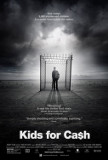Kids for Cash (United States, 2014)
February 07, 2014
The underlying incident presented in first-time director Robert May's documentary, Kids for Cash, has been called one of the most shocking recent judicial scandals. By interweaving talking head interviews with archived news footage, May (who served as an executive producer for Errol Morris' The Fog of War) tells the story of Judge Mark Ciavarella, the hard-line justice who presided over Luzerne County, Pennyslvania's juvenile system from 1995 until 2009. Ciavarella was known for enforcing a strict no-tolerance policy for school infractions. During his tenure, he sent thousands of children to privately-owned juvenile detention centers - some guilty of little more than becoming involved in a school fight or creating a satirical webpage poking fun at an administration official. One of the reasons behind Ciavarella's high rate of convictions was postulated to be the "finder's fees" collected by him and Judge Michael Conahan. In essence, both judges profited by keeping the detention centers well-populated. The scandal, when it broke, not only cost Ciaveralla and Conahan their jobs but became a national news story that was dubbed "Kids for Cash."
Kids for Cash provides a clear, balanced narrative, opening with campaign ads and footage of Ciavarella giving a "tough talk" presentation at a Scranton school. It follows the two judges through their trials. In the process, May was able to obtain candid interviews with both Ciavarella and Conahan. The men show deep remorse, admit their ethical violations, but are ambivalent about whether they believe themselves to be legally culpable. Ciavarella denies the "Kids for Cash" accusation, stating that while he was wrong in taking the money, it didn't impact his brand of justice. May also provides interviews with five individuals whose lives were irrevocably impacted by Ciaverella's decisions.
The movie argues that the post-Columbine way of thinking had a significant influence over what happened in Luzerne County during Ciaverella's terms. Although the concept of "zero tolerance" may initially seem to be a good policy for keeping schools safe, interviews with experts provide ample evidence of how it can be twisted and perverted to result in situations such as the "Kids for Cash" scandal. Ciavarella didn't look hard at the cases put in front of him. He was predisposed to issue guilty verdicts - partially because of his judicial philosophy and possibly because it was financially advantageous. While some of those he "sent away" were surely deserving of time in the detention centers, May illustrates that there were instances when benign individuals ended up suffering a punishment far worse than the one warranted for the crime.
One area in which Kids for Cash falls short is its attempt to craft a broad condemnation of the American juvenile justice system. May throws out figures about how the amount of money spent per child on education (a little over $10,000) is dwarfed by the amount spent on each child incarcerated in a detention center (a little under $90,000), but he fails to connect the dots. The disparity is impressive but the relevance is missing. Is he saying that if we spent more on education, there would be fewer juvenile detainees? Is he saying that too many children are being incarcerated for incidents that don't warrant their being taken away from home? While the movie's presentation of the "Kids for Cash" scandal hits the mark, it becomes unfocused the more it tries to apply its themes to the national social fabric. It's not that these issues don't warrant a discussion but May's rushed attempts to shoehorn them into Kids for Cash seems like an attempt to make the movie more than just about what happened in Luzerne County when Judges Ciavarella and Conahan were in power.
Kids for Cash may not be inherently cinematic (a lot of the footage, after all, first appeared on television) but it is compelling. May has structured the film to unfold chronologically; those who didn't follow the news story as it broke won't know the resolution. The most impressive aspect of Kids for Cash is how May allows the film's "villains" to be provided an opportunity to present their side of the story; this isn't a "hatchet job." We gain an understanding of what motivated Ciavarella and Conahan, although they don't come across as entirely sympathetic. That's a quality many documentaries don't strive for, let alone achieve.
Kids for Cash (United States, 2014)
Cast: Mark Ciavarella, Michael Conahan, Justin Bodnar, Hillary Transue, Charlie Balasavage, Amanda Lorah, Sandy Fonzo
Screenplay:
Cinematography: Jay Gillespie, Eddie Marritz
Music: MIchael Brook
U.S. Distributor: SenArt Films
U.S. Release Date: 2014-02-07
MPAA Rating: "PG-13" (Profanity)
Genre: DOCUMENTARY
Subtitles: none
Theatrical Aspect Ratio: 1.85:1
- (There are no more better movies of Mark Ciavarella)
- (There are no more worst movies of Mark Ciavarella)
- (There are no more better movies of Michael Conahan)
- (There are no more worst movies of Michael Conahan)
- (There are no more better movies of Justin Bodnar)
- (There are no more worst movies of Justin Bodnar)
Comments